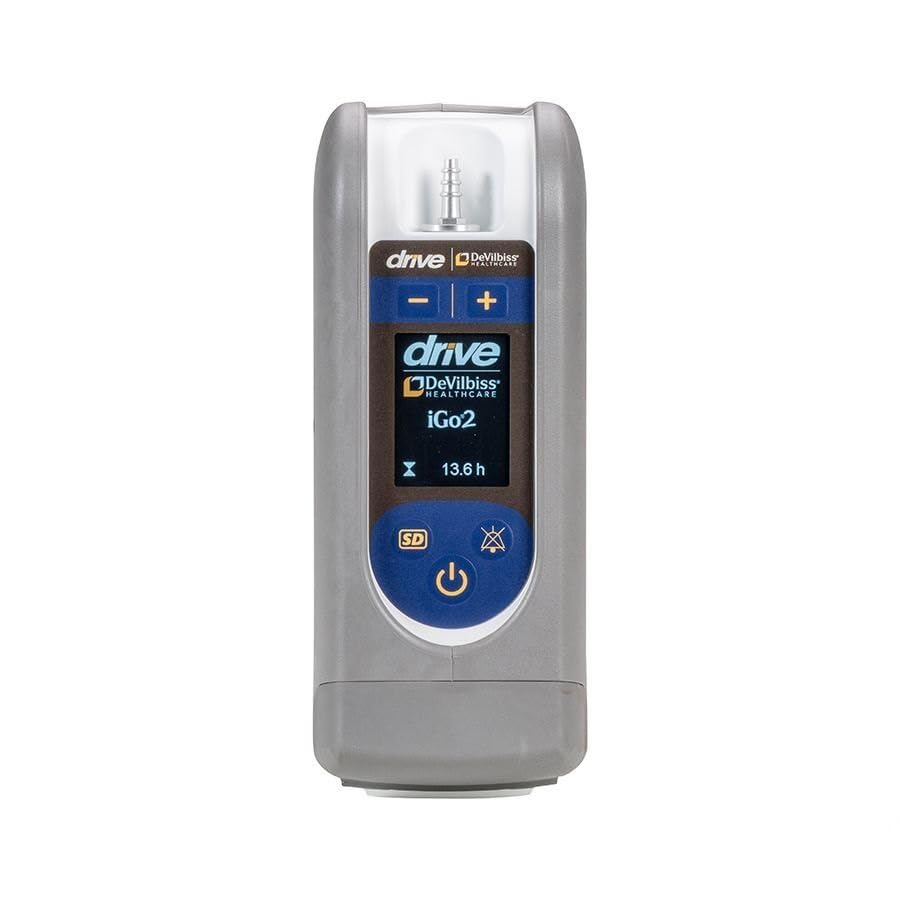The COVID-19 pandemic has shown us loopholes in the healthcare system. In other words, it is drowning in the ocean of modern healthcare needs.
In addition to this, the old-age care approach is a barrier to the healthcare system.
As a consequence, a fresh start is needed for the healthcare industry to focus on patient care along with maintaining its costs.
To fix the broken leg of the healthcare system, automation shows up as the only hope.
Automation in healthcare has heightened efficiency in various elements of medical services. The future of healthcare is automation, and healthcare platforms like ClinicSpots advocate this by using modern techniques and tools. Online scheduling of appointments and consultations with doctors, Q and A portals, chatbots, and data automation have boosted the productivity and capability of the healthcare sector.
But, before jumping right into the topic, let’s understand the benefits of automation in healthcare facilities.
Automation is fixing the loopholes in the healthcare ecosystem
Automation is transforming the entire healthcare ecosystem by helping everyone under the same roof.
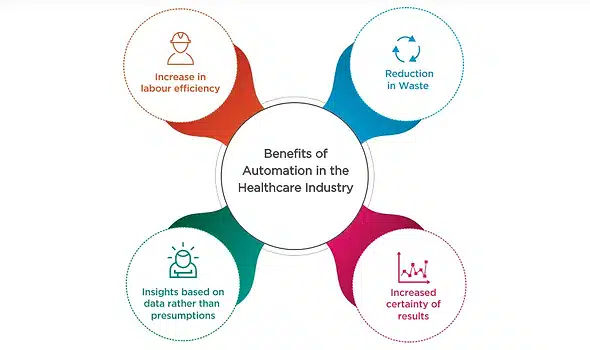
For instance,
- Quality care for the patients
- Reducing the work burden of the healthcare professionals
- Eliminating the unnecessary workflows for the administration
- Scaling up the healthcare ecosystem productivity
- Reduces the expenses associated with the all the workflows
Thus, automation is experiencing a massive adoption in the healthcare system, especially after the COVID-19 pandemic.
And the report says, “The global healthcare automation market is expected to reach the value of US$ 88.9 Billion by the end of 2028”.
No doubt, the market is growing at a rapid pace with the aim to keep patients’ modern demands on top along with reducing operational and maintenance costs for the healthcare ecosystem.
So, let’s explore where you can use automation in the healthcare ecosystem.
8 ways automation can enhance the productivity, flexibility, and scalability of the healthcare system
The purpose of the automation is simple,
- Improve patient outcomes
- Streamline workflow for the healthcare staff
- Remove the time-consuming barriers for the healthcare facilities
- And reduce the medical cost for the patients and overhead costs for the healthcare facilities
Here are the use cases of automation in healthcare.
- Error-free patient medical, financial, and personal data management:
Data is becoming more important than ever for the healthcare industry.
However, maintaining patient data is not an easy task for healthcare professionals, especially when there is a lack of automation in that.
In fact, a single error in data management can put the patients’ life at high risk.
Hence, automation is becoming more important in data management.
Without automation:
- Healthcare professionals need to do manual data entry into the EMR/EHR system at the point of care
- On a crucial note, high possibility of the manual errors
- Manual data entry is time-consuming for the medical experts
- It affects the quality of the patient care experience.
- Medical experts can’t focus on the patient medical condition due to the manual workflow
With automation:
- There’s no need to do manual data entry into the other healthcare IT systems at the point of care
- Can avoid the managing two complex healthcare tech systems
- Automation enables the healthcare staff to focus on the quality of care experience and patient outcomes
- It elevates the productivity of the care providers
- Automation eliminates data error
- Seamless data sharing into the other healthcare IT systems along with reducing the time-consuming process
- Healthcare facilities can avoid the time-consuming patients appointment and scheduling procedures:
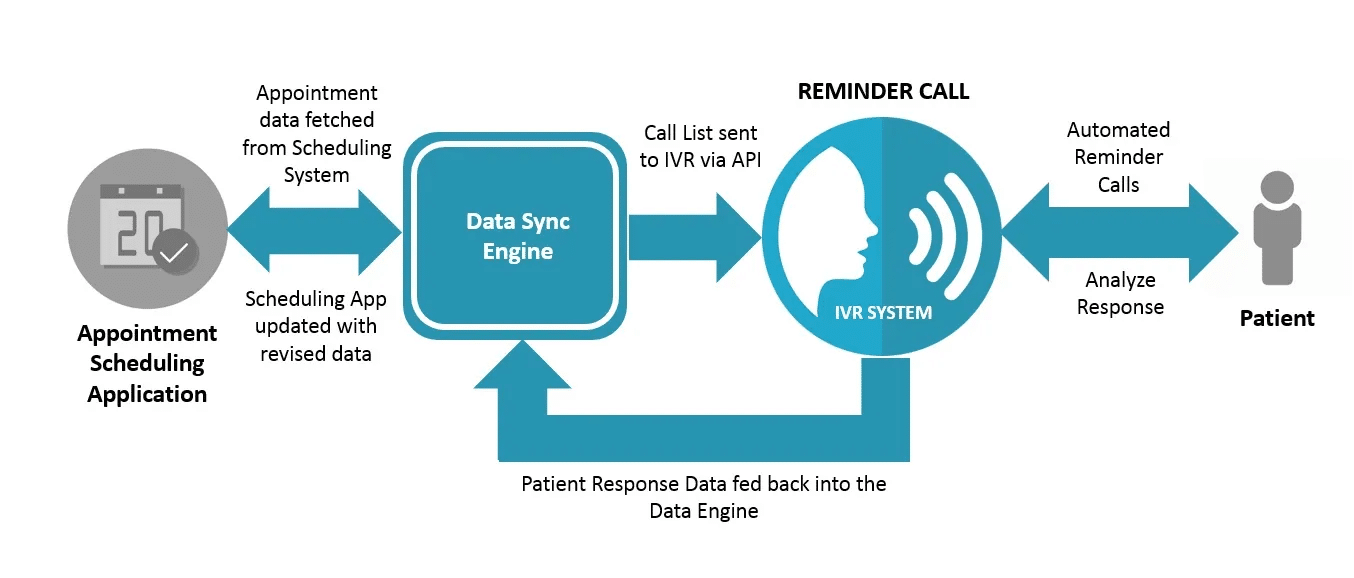
Patients are adopting online or virtual care solutions for any healthcare-related concerns.
This means, healthcare facilities need to collect patients’ medical, insurance, and personal data to schedule appointments with the doctors as per their requirements.
For instance, patients schedule an appointment with a physiotherapist.
Without automation:
- Data collection is a tedious process for the healthcare administration
- Scheduling appointments based on patient data is a time-consuming
- If the healthcare expert is not available as per the scheduled timing, informing the patients about it in the meantime is not possible.
- The administration department needs to deal with the phone calls from the patients.
With automation:
- You can automate the patient data collection and processing for the scheduling appointment with the doctor
- Based on the data and care requirements, it automatically schedules an appointment with the doctor
- If the doctor is not available for the scheduled appointment for some reason, the system automatically notifies the patients regarding it
In the true sense, it is a seamless experience for the patient with the help of automation in healthcare.
- Reducing the repetitive workflows for the healthcare professionals and administration staff:
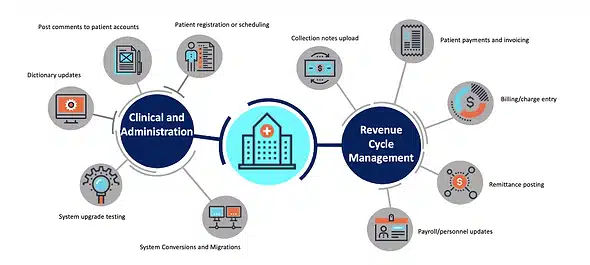
Repetitive clinical workflows not only affect the healthcare professionals but also impacts the patient care experience and the entire healthcare ecosystem.
In the true sense, it is the most crucial aspect of healthcare facilities.
Avoiding the consequences of repetitive workflows results in burnout of healthcare professionals.
Thus, it’s essential to focus on the workflow of the healthcare professionals and administration staff. For instance,
Without automation:
- It affects the mental health of healthcare professionals.
- Reduces the productivity
- Poor patient outcomes and quality care experience
- Increases the operational and medical costs
- Burnout of the medical staff
- High possibility of the medical errors
With automation:
- Administration staff can focus on the other core responsibilities
- There is no need to worry about the medical errors
- Reduces the medical costs for the patients and operational costs for the organization
- Improve the quality of patient care experience
- It enables healthcare and administration staff to easily maintain their well-being
- Increases the efficiency and productivity of the healthcare system while at the same time reducing the burnout of the staff
- Automation speeds up the financial and claim management process of the healthcare
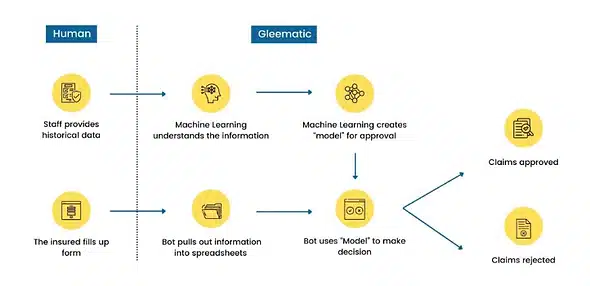
Financial and claim management procedures are time-consuming and tedious processes for the healthcare staff.
Because they need to deal with both the financial and medical data of the patients at the same time.
For instance, maintaining the records of the patients such as prescription notes, lab reports, facility costs, and medical experts fees.
Without automation:
- Manual data entry for the claim and billing management
- Process is time-consuming
- Lower accuracy and productivity
- An inefficient claim may affect a healthcare system’s cash flow
With automation:
- It speeds up the insurance coverage procedure
- Eliminates the manual errors in the financial data
- The system automatically updated the patients about its billing and claim procedure
- Automation boosts the account settlement procedure
- Reduces the possibility of payment delays
- Automation makes healthcare supply chain management much easier and more efficient

Medical supply chain management is a headache for any small or large-scale healthcare facility as it directly impacts their operational costs, labour management expenses, and overall productivity of the facility.
As a result, automation in healthcare supply chain management is must needed because,
Without automation:
- Need to do manual data entry
- There is a high possibility of wrong information in a data report
- No real-time visibility of the medical supply
- Supply delays may affect the patients’ outcomes
- Lack of streamlined communication
With automation:
- Real-time visibility of medical supply
- Automation improves transparency and scalability
- Reduces the error-generating data reporting
- It streamlines the communication
- No need to worry about the supply and care delays
- Reduces the labour and operational costs for the healthcare system
In simple terms, automation in the healthcare supply chain helps the medical experts to get the right medical supply, to the right patients, at the right place and time.
- Chatbots to assist both patients and healthcare professionals:

Chatbots are creating a new healthcare environment.
It contains AI (Artificial Intelligence) and ML (Machine Learning) algorithms that interact with the patients and healthcare professionals to assist them in completing a specific task using large-scale data.
In fact, it automates some tasks for healthcare professionals so that they can focus on patients’ medical conditions.
Without automation:
- Patients need to connect with the healthcare professionals for a simple questions
- Healthcare professionals need to manually collect the information for follow-up meetings
- Appointment booking phone calls are annoying and time-consuming for the healthcare ecosystem
With automation:
- It automatically collects the patients’ data to assist medical experts in follow-up visits and beyond
- Chatbot supports the patients with an appointment booking
- It reminds the patients of appointments and medication
- Supports healthcare professionals at the point of care using large-scale medical data
- Eliminates time-consuming phone calls
- Give real-time answers to patients’ health-related queries
- Automation increases the productivity of the pharmacy stores:
Pharmacy stores are always surrounded by repetitive workflows.
For instance, manual data entry, prescription refilling and much more.
With automation, one can increase the productivity of their pharmacy stores by eliminating most of the repetitive tasks.
As a result, it will help them to work more efficiently, accurately and faster.
Without automation:
- Need to do manual data-entry
- The process is time-consuming with a high possibility of medical errors
- Requires a more workforce due to the work burden
- Prescription refill procession is a tedious process
- Increases the overall operating cost for the pharmacy store
With automation:
- Can avoid the manual data entry and medical errors
- Reduces the work burden of the pharmacy staff
- Reduces the operating costs
- Can automate the prescription ordering and refilling process
- Automation streamlines the inventory management
- Improves the productivity of the pharmacy store
- Makes order and payroll management easier and faster
- It makes LTC homes and retirement homes more effective:
Whether it’s a hospital, pharmacy store, or long-term care home, healthcare professionals always look forward to staying on top when it comes to offering a quality care experience.
But due to the repetitive and other LTC home workflows, they keep failing to achieve their clinical goals with ease.
What’s more important is that healthcare professionals need to pay close attention to every person in LTC homes.
Hence, automation in healthcare, especially in long-term care facilities is required.
Without automation:
- Can’t focus on the quality of care experience
- Resident data management is a complex process
- Need to maintain all the medication data of the retired or residents
- Have to send documents or emails to the pharmacy store for medication order
- Time-consuming workflow lowers the care outcomes
With automation:
- Healthcare professionals can focus on other key responsibilities
- No need to worry about the clinical and medical data management of the residents
- Automation simplifies the medication management system by reducing the medical errors
- It gives medication reminders for each of the patients without losing grip on the accuracy.
- It offers scalability, transparency, and flexibility to the LTC homes.
Automation in healthcare is beyond sending text messages
Now you have a clear sense of how automation can help healthcare facilities to become more flexible, scalable, and efficient along with maintaining the overall medical and operational costs.
On a crucial note, they need to focus on the right strategy to execute automation in healthcare.
For instance,
- Real-time analysis
- AI and data-driven decision-making system
- Accurate and secure data sharing and management
To achieve that, healthcare facilities must focus on healthcare app development so that they can achieve their organizational goals without adding any complexity.
Last but not least, modern healthcare needs are rising so healthcare providers need to keep up the pace with the needs of the patients, and automation in healthcare is the only way to achieve that.
*****



